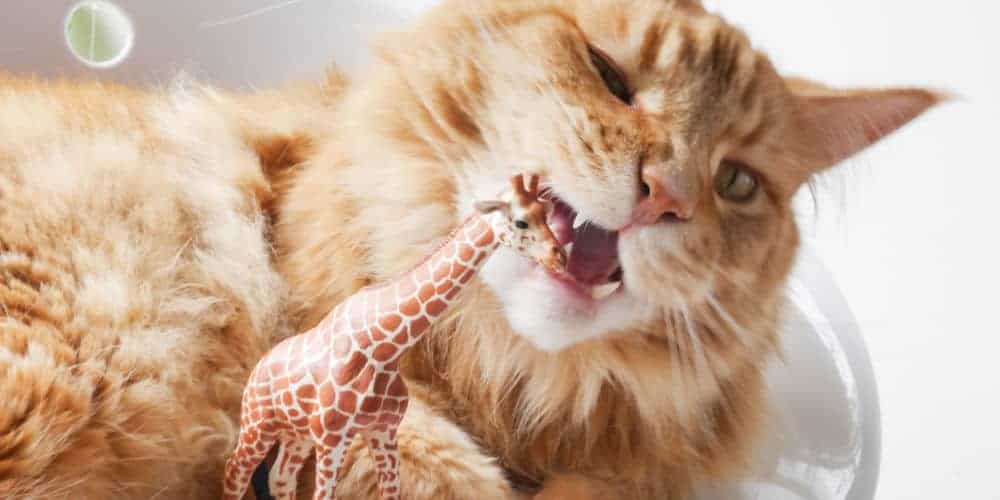Why Does My Cat Chew on Plastic?

When your cat displays odd behaviors, it can be very worrisome. Some of these problems involve your cat chewing or eating things that they should not. If you catch your cat eating plastic, you probably wonder what your cat is thinking. What compels your cat to chew on plastic?
Your cat could be chewing on plastic for a variety of reasons. Usually, if your cat is chewing on plastic, it is because of a health issue, a behavioral issue, or an anxiety issue. Pica, anxiety, predatory instinct, and nutritional problems can all cause your cat to want to chew on plastic.
You must narrow down why your cat chews on plastic so that you can find a solution. Chewing on plastic can be harmless, but it can also be quite dangerous. If your cat starts ingesting plastic in large quantities, it can cause serious damage to their internal systems. Read on to learn why your cat chews on plastic and how to stop it.
Cat Attitudes is reader-supported. When you buy through links on our site, we may earn an affiliate commission.
Reasons Cats Chew on Plastic
Cats are mysterious creatures. Sometimes they do things that leave their owners scratching their heads in wonder. Still, chewing on plastic can be dangerous for your cat, so it is important to know what is causing this behavior.
Following are some of the reasons that cats chew on plastic. These vary widely, so your cat could fall into any of these categories.
- Pica
- Anxiety
- Predatory instinct
- Nutrition and food
Pica
Pica is a psychological disorder that affects both humans and animals. It causes the affected to crave and compulsively consume inedible items. If you think your cat might have pica, you should consult your veterinarian. This is a serious condition and should not be taken lightly.
When an animal has pica, they eat articles that are non-food related like soap, dirt, and other odd items, like plastic. This condition can indicate mineral deficiencies and other disorders and should warrant a visit to the vet.
This issue can be very critical in your cat’s health, so please do not hesitate to call the doctor if you suspect pica to be the culprit of your cat’s strange eating habits.
Anxiety
Another psychological disorder that can have your cat chewing on plastic is anxiety. Just like humans, animals can have anxiety as well. There are several reasons your cat can be feeling severe anxiety. Luckily, you can take measures to relieve their anxiety and eliminate the strange behaviors that come along with it.
- Loud noises and music should be minimized in your cat’s environment.
- Keep a routine for your pet (feeding times, sleep habits, etc.)
- Never introduce a cat who is not good with children or other animals into a home with children or other animals.
Making your cat feel comfortable and secure is important. Alleviating the cause of anxiety can also alleviate your cat’s compulsion to want to chew on plastic and other materials that are harmful.
Predatory Instinct
Cats are notorious hunters. Cats have an innate “wild” side which should be encouraged. Pieces of plastic floating around on the floor can easily catch their attention and trigger their desire to hunt and play. Playful cats react to plastic the same way they react to bugs or to laser pointers. Provide other toys, so your cat does not chew plastic.
If you give your cat plenty of stimulating toys, your cat will have an outlet for its natural predatory instincts. Toys that provide the option for chewing are good, and cats are well known for their swatting abilities, so these types are recommended as well.
Your cat should have safe items that they can “attack” when feeling predatory and primal. These toys will provide a feeling of security and safety as well. Additionally, it will keep your cat from seeking out bits of plastic to use as toys.
Some good examples of attack toys for your cat are:
- Toy mice
- Laser toys
- Feather wands
- Puzzle toys
Also, keep plastic off the floor. If you keep plastic wrappers and trash out of your cat’s reach, they will have nothing dangerous to chew on or swallow.
Nutrition and Food Needs
Most food packaging includes plastic. It is possible that your cat simply smells the cat food remnants on the plastic wrapping. As stated above, keep these plastic wrappers in the trash and out of your cat’s reach.
Make sure your cat’s nutritional needs are met. You and your vet can work together to determine if your cat is getting the proper nutritional content from their everyday food. If not, this could be the reason why your cat is seeking out the plastic to chew and eat.
If your vet determines that a change in diet is necessary, patience is a virtue. Eventually, the nutrients in the food that your vet recommends will make a pronounced improvement in both your cat’s physical as well as their mental health. This is a definite solution to remedying many bad pet eating habits.
Your Cat Might Be Tempted to Chew Plastic
It is essential that you keep all tempting plastic items away from your cat. This includes plastic bags. Some items, such as grocery bags, may have a food smell or actual food particles on them that cause your cat to be naturally attracted to them.
These items should be kept out of your cat’s reach and thrown out or put away as soon as possible. It is only natural that your cat would be attracted to these things, which may contain remnants or pieces of food.
These plastic items are well-known culprits for putting your pet in danger. If your cat gets a hold of pieces of plastic or consumes food that they are allergic to, they could become very ill. Foods that your cat is allergic to can result in dire consequences. You have to be extra vigilant when handling plastic, especially if your cat is still a kitten.
How to Know When Your Cat Has Eaten Plastic
The following are warning signs to look for in the case that your cat has become sick from eating plastic.
Your cat may chew plastic and not get sick. However, there are instances where your cat may swallow plastic intentionally or accidentally.
If enough of the material is ingested, your cat can become quite ill. This is especially true if your cat has pica. Familiarize yourself with these warning signs, so you know when to head to your vet’s office.
|
Diarrhea |
Diarrhea means something is amiss in your cat’s diet. This may simply be something related to their actual food consumption, or they may have eaten an item such as plastic. |
|
Vomiting |
Excessive vomiting is abnormal. Watch for the drooling, as it may not be as obvious as the vomiting. |
|
Appetite loss |
Not eating/chewing/anorexia is a sign that there is gastrointestinal distress in your animal. |
|
Abdominal pain |
A sore/swollen tummy could mean your cat has consumed plastic. These symptoms may indicate a possible obstruction. |
|
Lethargy |
If your cat displays signs of a lack of energy (not playing, sleeping more, laying around), this is also an indication that something is wrong. |
|
Behavioral changes |
If your cat is behaving strangely, something could be wrong. This could be a lack of playing, walking with a strange gait, or just acting completely differently. |
Cats are famous for keeping their ailments hidden. So it is up to you to place close attention to what your cat is chewing on. Keep plastic out of your cat’s reach and keep a close eye on their behaviors. You can also provide plenty of good, nutritious food along with stimulating fun toys to keep your cat entertained.
Final Thoughts
Now that we have explored the reasons that your cat might eat plastic, you are ready to do the absolute best that you can to make sure that your cat is safe and healthy. Watching out for the signs mentioned is crucial, and cat-proofing your home is a great way to prevent problems and health issues or worse.
It is not rare for a cat to eat plastic. The old adage about a cat’s curiosity had to have come from somewhere. Still, now that you are armed with this knowledge, you can watch out for and reduce the chance for your cat to get a hold of dangerous items.
